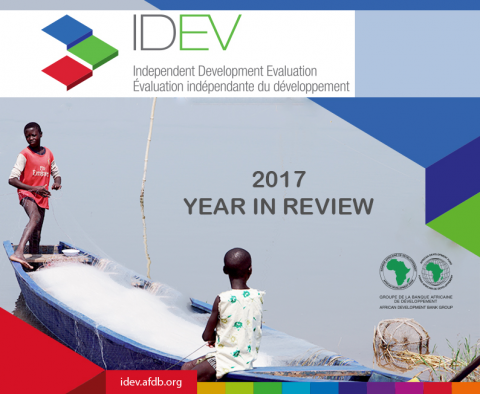Friday, 29 December, 2017

2017 was a year of adaptability and resilience for Independent Development Evaluation (IDEV) at the African Development Bank. Indeed, against all odds (IDEV has been operating at 70% capacity for most of the year) 9 influential evaluations were delivered by IDEV to AfDB Management and/or the Board of Directors. Most of these will be formally presented to the Board and published in the first quarter of 2018.
- 2 Project cluster evaluations: IDEV delivered evaluations of clusters of Bank projects in agricultural value chains development and rural electrification, thereby supporting learning in the areas of the High 5s.
- 2 Sector and thematic evaluations: focused on Agricultural Value Chains and Water and Sanitation.
- 2 Country Strategy and Program Evaluations: for Cote d’Ivoire and Nigeria
- 1 evaluation of the Bank’s Regional Integration Strategy and Program in Central Africa
- 1 Corporate evaluation: an independent review of the Bank’s Human Resources Management and Strategic Directions, which will inform the new People Management strategy
- A comparative study of Board Processes, Procedures and Practices across Multilateral Development Banks was also delivered.
IDEV also led the production of the Evaluation Cooperation Group reference document on integrating gender into project-level evaluations and made substantial efforts to disseminate key evaluation results within the Bank and in its Regional Member Countries.
Another 25 evaluations are currently ongoing and are expected to be delivered in 2018. These evaluations will provide evidence-based and credible information to shape the Bank’s future actions in key strategic areas for better impact.
On the Knowledge Management and learning front IDEV organized two regional knowledge sharing events on private sector development, in Nairobi and Pretoria, and hosted three sessions during the 8th African Evaluation Association (AfrEA) conference in Kampala.
The four editions of eVALUation Matters, IDEV’s quarterly magazine dedicated to perspectives and insights on evaluation and development issues looked at: The Problem with Development Evaluation and what to do about it; The Comprehensive Evaluation of Development Results: Behind the Scenes; Evaluation in the era of the SDGs; and Evaluation as a Driver of Reform in IFIs.
For Evaluation Capacity Development and Partnership building, IDEV maintained its two-pronged approach of focusing on both the demand for and supply of evaluations. It worked with the governments of Ethiopia and Tanzania to develop the next program of support for strengthening their national evaluation systems and participates in the Twende Mbele South-South cooperation initiative. IDEV, which continues to host the secretariat of the African Parliamentarians’ Network on Development Evaluation, also supported the third Annual General Meeting of the network.
2017 saw the launch of our webinar series targeted at the evaluation community in Africa and beyond, on key evaluation topics and methodologies. IDEV also facilitated the training of AfDB evaluators on presentation skills as well as evaluation methodologies and concepts.
Strategic partnerships were built with leading experts such as the Centers for Learning on Evaluation and Results (CLEAR) to promote a culture of evaluation and facilitate targeted and relevant learning opportunities for a variety of evaluation stakeholders at the regional level.
In 2017 IDEV continued its contribution to the global evaluation community by participating in two meetings of the OECD/DAC Evalnet Task team for Evaluation Capacity Development, the EvalPartners Global Forum 2017, the National Evaluation Capacities Conference 2017, the CLEAR Initiative Global Forum 2017, and the global conference of the International Development Evaluation Association 2017.
As 2017 closes in, it is with a sense of achievement and renewed commitment to foster accountability, enhance learning and promote an evaluation culture that IDEV is looking forward to 2018.

